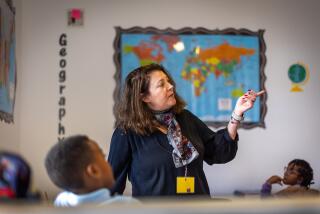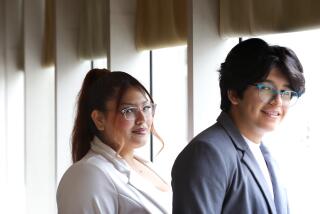Prestigious Phillips Academy Preps Student Body for Success
ANDOVER, Mass. — Phillips Academy, in this northeastern Massachusetts town, was the first boarding school to be incorporated in the United States. The year was 1778 and the Revolutionary War was still being fought.
Over the past 212 years, the prestigious prep school has graduated some of the most prominent Americans in the nation’s history.
Oliver Wendell Holmes went to high school here, as did Samuel F.B. Morse, inventor of the telegraph and Morse Code, and George Herbert Walker Bush, President of the United States.
Artist and famous equestrian Paul Revere created the school’s seal.
“One of the hallmarks of Phillips Academy is excellence,” said Bush during a visit last November to the 500-acre campus. The President planted a Zelkova elm from the White House on the school’s Great Lawn to commemorate the 200th anniversary of an official visit to Phillips Academy by another President on Nov. 5, 1789--President George Washington.
Washington had been President of the new republic less than a year when he visited the 23 students of the academy. Washington had no children but his nephew and six grand-nephews went to school here.
President Bush graduated from the school in 1942. Historian Garry Wills, in a 1988 Time magazine essay, wrote: “His parents, Phillips Andover Academy and the war made George Bush what he is.”
Bush was senior class president, president of the Greeks, captain of the soccer team, captain and manager of the baseball team. “I loved those years,” Bush said during his visit. He was a member of the school’s board of trustees from 1967 to 1979. Three of his sons are also Phillips alumni.
Phillips Academy has 1,200 students--633 boys, 567 girls--from 47 states, the District of Columbia, Puerto Rico, the Virgin Islands and 36 foreign countries.
Its students have come from China, Taiwan, the Soviet Union, nearly all the European countries, Japan, Bangladesh, Pakistan, Kuwait, the United Arab Emirates, Botswana, Zambia and many other nations.
“At most high schools, kids are from one town or the immediate area. Here they come from all over America, from all over the world. A typical high school will have some bright kids. Here they are all bright, the cream of the crop. That’s very exciting,” said John Richards II, who has taught at the academy for 32 years.
“Young people here understand that it is OK to be smart . . . black or white, rich or poor . . . (and have) academic talents,” said Donald W. McNemar, 46, the school’s 13th headmaster.
He described Phillips Andover, as the academy is known, as a high school that “brings together talented young people from across the country and around the world and challenges them to use that talent and to share it with others. We have students representing 60 nationalities, many races, many religions forming this unique community. We are fortunate to have a scholarship program that allows us to invite talented kids regardless of family finances.”
The school has 107 black students, 53 Latinos and 120 Asians.
Tuition is steep, $14,600 a year. But the school uses $4.7 million in annual scholarship funds to search out students from diverse ethnic, socioeconomic and geographic backgrounds.
Jeannie Dissette, dean of admissions, described the recruitment as an effort “to find bright kids who don’t know about Phillips.
“There is a notion that this is a school only for the most affluent,” Dissette said. “True, it is an elitist’s school, but elitist from an academic standpoint. Here, 37% of the students receive scholarships that pay for part or all of their tuition, room, board and even air fare to and from home and the campus. Financial aid is based, of course, on need.”
Students, who must take three years of both math and languages, carry a heavy workload; at least two hours every night are devoted to study. They can select from 285 courses, including Russian, Chinese, Latin and Greek, as well as ethics, philosophy, logic and comparative religions. The history and social science department offers Urban Studies, American Race Relations, Men, Women and American Culture, and Nuclear Weapons: Proliferation and Responses.
There are 160 buildings on campus, a blend of Colonial, Federal, neo-Georgian and modern architecture. Students study the War of 1812 in a building constructed before it took place. Samuel Smith wrote “My Country, ‘tis of Thee” in 1832 in a dormitory still in use. Many former faculty members are buried in the campus cemetery, as is Harriet Beecher Stowe, author of “Uncle Tom’s Cabin” and wife of an academy teacher.
The Oliver Wendell Holmes Library, named in honor of the 1825 graduate, has more than 102,000 volumes, making it the largest secondary school library in the nation.
After classes, there are sports, weekly student concerts and plays. Actor Jack Lemmon, Class of 1943, heads a major fund-raising campaign for the school. As a student, Lemmon wrote, starred in and directed his senior class play. Kevin Heelan, head of the theater department, is a playwright and actor. He wrote “Heartland,” the Broadway production starring Sean Penn.
In 1987, Phillips Andover became the first high school to have an exchange program with a Soviet high school, in addition to its programs in China, Spain, France, Mexico and Senegal.
Two-thirds of the 226-member faculty, which includes a priest, rabbi and minister, hold advanced degrees and 31 are published authors.
Students say they come to the school expecting to excel. Most have their goals in place. William Tong, 17, senior class president from Glastonbury, Conn., plans to be a U.S. senator. Kristan Kane, 15, a sophomore from San Diego wants to be a brain surgeon.
“I came to Phillips Andover because this is the best school I could find,” said Jamie Sun, 17, a senior from Irvine. Julia Bloch, 16, a senior from Davis, enrolled because “Phillips offers a lot of theater. I have written eight one-act plays. Four have been produced on campus. What other high school could I go to and have this kind of opportunity?”
In a Chinese-language class taught by Xiaomin Ni, an exchange teacher from China, Katy Breen, 17, a senior from San Francisco, explained why she is in the class: “I hear Chinese people speaking on the cable cars and streets of San Francisco all the time. Now I will know what they’re talking about.”
Many students such as Rebecca Howland, 16, a junior from Williamstown, Mass., are from families who have attended the school for generations. “My father, grandfather and great-grandfather, all the way back to the school’s beginning, have gone to Phillips Andover,” she said. “But I am the first girl.”
The school became co-ed in 1973 when it merged with Abbot Academy, an adjacent girl’s boarding school established in 1829.
“Many think it’s a little rich school, but it’s not,” said Otis Chandler, Class of 1946. “It has a cross-section of America and a wonderful composition of students from all over the world,” said the former Los Angeles Times publisher, now chairman of the Executive Committee of the Board of Directors of Times Mirror Co.
Chandler said it was at Phillips that he first became personally acquainted with minorities, “where I developed my liberal outlook in race relations. I roomed with a black student whose father was a janitor in a Chicago nightclub. He was there on scholarship.
“Phillips Andover is a great school. For a Californian, it’s hard to believe a high school can be over 200 years old.”
President Bush, Jack Lemmon, and Otis Chandler are typical of Phillips graduates who maintain a lifelong commitment to the school that played a key role in shaping their intellectual pursuits and moral values, faculty and alumni say.
More to Read
Sign up for Essential California
The most important California stories and recommendations in your inbox every morning.
You may occasionally receive promotional content from the Los Angeles Times.










